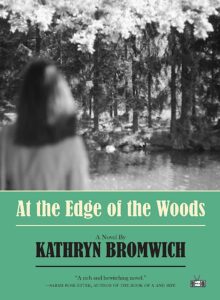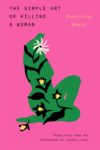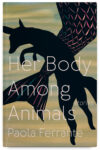
[Two Dollar Radio; 2023]
At the center of Kathryn Bromwich’s gorgeous debut novel At the Edge of the Woods is a collection of tensions that resist coexistence, foils that reflect and repel each other. Even categorizing the novel is difficult; pulling from both the environmental novel and feminist novel, it does not clearly reside in either of these traditions. The remote Italian mountainside serves as a setting for the narrator’s struggles to escape gendered violence, while her journey to escape that violence serves as the impetus for her exploration and appreciation of the natural world. There are two stories here, inextricably linked, neither taking precedence over the other.
Laura, the novel’s narrator, has recently moved into an old, dilapidated cottage on the outskirts of a small village in the Italian Alps. The previous tenant, a former soldier, left the cabin behind without warning, supposedly after suffering a horrible hunting accident. Town gossip has various theories about what really happened to him. “Either way,” Laura notes, “his name is only ever uttered in a hoarse whisper, as if telling ghost stories. . . . Most of the time, he is referred to simply as il mostro.” In this novel, names—the ones people call us and the ones we choose for ourselves—matter, and this early tale of il mostro cues readers to pay close attention to them.
Laura’s first nickname in the town is “la bella forestiera, the beautiful foreigner,” which reminds her that though she was born in Italy, when she moved to France after marrying her husband, she lost her “once-clear identity” and became an outsider at home. What’s more, the villagers cannot seem to decide whether to call her signora or signorina, as Laura’s marital status remains an open question for both the villagers and the readers. She is married, as we learn in an interlude that flashes back to her fleeing France to escape her intolerably cruel and abusive husband Julien. In the brief scenes in which Julien appears, he only ever refers to Laura as a nameless you. Laura’s decision to leave without ending the marriage is a first and final act of rebellion against Julien, as she leaves behind her nameless existence in search of safety and peace.
And so Laura returns to Italy, something between a foreigner and prodigal daughter, an independent woman and a married woman running from her husband. Just as Laura is caught between names, she is caught between two impulses, two versions of being a woman. She can be orderly, restrained, precise, controlled, or she can be sensual and indulgent. Her occupation of the liminal space at the edge of the woods is the site of this tension. She is both of the town—where she tutors local children in languages, runs her few errands, and very occasionally participates in the social milieu of the village—and of the land surrounding her cabin, of mountains and forests, where she takes regular hikes, tends a bountiful garden, and eventually explores the secrets of the woods.
The first two chapters of the novel introduce us to Laura’s incredibly regimented daily routine. She wakes early in the mornings and sets off on a hike through the woods and up to the top of a pass; she narrates in detail the steps of this hike, down to when each layer of warm clothing is removed and when she consumes the water and pastry she packed for the journey. When Laura reaches the top of the pass, the view sometimes “fills [her] with awe, with the sense of being fully alive” and “once or twice, the sight has left [her] lost for words, breathless, as though [she] might be approaching something meaningful but just out of reach,” though more often than not, she feels “nothing at all.” Laura then returns to the cabin, where she changes her clothes, practices smiling appropriately, and goes into town for her daily work and errands. She even rehearses the small talk she will make with villagers, and the order she always puts in at the shop. Laura’s tightly controlled schedule, a ticking-off not only of tasks, but also of feelings, of relations, is echoed in the flashback to her time in France, where her marriage to an overbearing man required a perfectly calculated just-so-ness. The performance goes back even further. Preparing to go into town, Laura thinks: “I feel myself once again turning into the docile girl I was brought up to be, a performance I find both calming and degrading.”
I was surprised, then, when Laura’s routine changed: laudanum, cheap wine, and a lover. These vices speak to a different Laura, not a demure, controlled housewife, but that figure’s mirror; a sensual, bodily presence, someone who pursues pleasure. One day she and her lover both take a few drops of laudanum and “Everything is heightened, exquisite: the quality of [their] jokes, the sensation of his hands on [her] body.” Over the course of the novel, this part of Laura becomes even stronger, especially after she endures a serious illness that brings her deeper inside her own body. Laura becomes feral, going into town less and less often and venturing deeper into the forest, where a wolf and an alpine lake serve as substitutes for the protection, company, and refreshment the village may have once offered. Laura begins to experience mystical visions. She sees her garden exploding with tropical plants, a menagerie of wildlife, and a tree more accurately described as a woman. Once caught between two worlds, Laura sheds the expectations of normative womanhood and surrenders herself to the woods.
Bromwich’s language shifts with Laura, as lusher and lusher prose marks the second half of the novel. In the clearing around Laura’s cabin, “Flowers and plants have flourished into ornate bushes, some climbing the cabin’s walls, others spreading across the grass. Their leaves are lustrous, sparkling in the warm light; petals pulsate, vibrant and electric, almost as though they were breathing.” Readers affectively experience the same journey as Laura, who encounters this beautiful natural landscape (and enough cannot be said about Bromwich’s ability to write the natural world, which draws easy and apt comparisons to Richard Powers) and goes from feeling nothing to the very opposite.
Near the end of the novel, entering a crowd of villagers, Laura hears an old woman calling her, alternatingly, “santa, strega, saint, witch.” Names matter, and Laura wonders which is true of her. Is she a woman made holy by an ascetic control over her impulses, or is she a witch marked as dangerous for conceding to her impulses? The novel’s final image suggests that Laura has realized a femininity that collapses the boundaries between those two, as she revels in a holy vision of the lushness of a wild, untamed world. And Bromwich too, whose writing throughout the novel is equal parts precise and lyrical, creates a wholly beautiful novel in that in-between space.
Mary Pappalardo is an editor and writer based in Philadelphia. She is a Fiction Editor at The Offing and her writing has appeared in the Los Angeles Review of Books, Real Life, and others.
This post may contain affiliate links.







